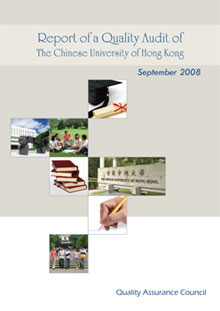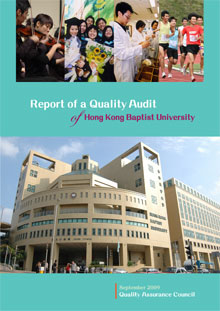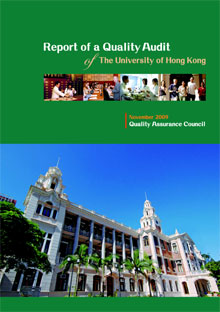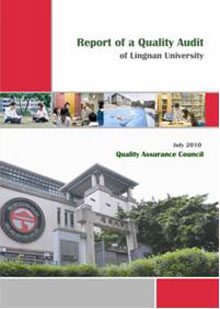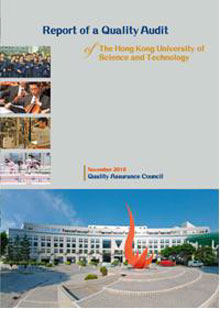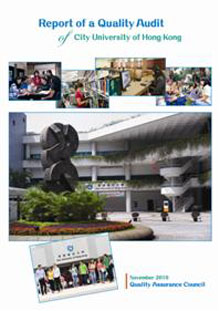
|
|
|
|
|
|
|
|
|
|
The University Grants Committee (UGC)-funded institutions receive a substantial amount of public funds. As a funding body of this sector, the UGC has the duty to provide assurance to the Government and the community that the institutions are providing quality education in a cost-effective manner. The UGC holds quality assurance dear to its heart and has long performed an important role in assuring the quality of the provision of the UGC-funded institutions through the conduct of various reviews, including the two rounds of Teaching and Learning Quality Process Reviews, the first of which started in 1995. The UGC’s establishment of the Quality Assurance Council (QAC) in 2007 as a formal machinery to assure the quality of the educational provision in the UGC sector signifies its firm commitment to upholding quality of teaching and learning. Conduct of Quality Audits A sound and transpartent quality assurance mechanism is essential so that the community can be assured of the quality of the education being provided by institutions. Robust frameworks for quality assurance can also help maintain and enhance the international competitiveness of the institutions and the higher education sector as a whole. The QAC has been assuring the quality of the educational experience offered by the UGC-funded institutions through the conduct of quality audits which cover all first degree programmes and above, however funded, offered by the institutions. “Fitness-for-Purpose” The QAC does not attempt to straitjacket institutions through a single set of standards or objectives, but recognises that each institution should have objectives appropriate to its mission. The quality audits are intended to assure the UGC and the public that the institutions deliver the promises they make in their role and mission statements. An audit is therefore an audit of an institution’s “fitness-for-purpose” in teaching and learning. The methodology of the QAC quality audits has been drawn up in the light of the overseas quality assurance practices. These include: the establishment of Audit Panels, which conduct visits to the institutions to meet the staff and students and other stakeholders to understand the institutions’ internal quality assurance mechanisms; the inclusion of overseas academics in the Audit Panels to bring in expertise and third-party oversight; and the presentation of the Panel’s findings in the form of Commendations, Affirmations, and Recommendations (CARs), i.e. Commendations of good practices; Affirmations which recognise improvements the institution is already making; and Recommendations for improvement. How to Read a Quality Audit Report The purpose of the report is to help the institution better understand its own strengths and opportunities for improvement so that institutions can make an informed decision on the improvement measures that need to be taken. In this context, the number of CARs is not as important as the substance of the CARs. All CARs are unique, and it will be misleading to rank or grade the institutions on the basis of the number of CARs obtained by each institution. Indeed, institutions are diverse in character and mission, and cannot be subject to a single set of performance standards. The QAC’s quality audits therefore are not intended to rank or grade institutions. Enhancing Public Understanding of Institutions’ Educational Provision Audit Reports, together with the institutional response, are published in full. Publication meets public expectations that the institution is accountable to the public and the audit process is transparent. Publication of the Audit Reports can give public access to more information on the quality of institutions’ educational provision. The Audit Reports published so far have been able to attract media attention which has in turn helped arouse an interest on quality assurance matters in the community. The Quest for Continuous Improvement Since one of the principal aims of audit is quality enhancement, the QAC expects that the institution will act on the findings in the audit report. Indeed, the institution’s sense of professionalism and care for its reputation will motivate it to do so. The QAC monitors the implementation of improvement measures through the consideration of the progress reports to be submitted by the institution 18 months after the publication of the Audit Report. Progress of QAC’s Work The first round of quality audits commenced in 2008 and is near its completion. So far, the QAC has published six Audit Reports with the remaining two i.e. the audit reports of The Hong Kong Polytechnic University and The Hong Kong Institute of Education being finalised for publication within this year. We are glad to note that the audit processes have helped the institutions reflect on the adequacy of the institutions’ quality assurance mechanisms, and have prompted the institutions’ management to focus more on the quality of teaching and learning. Way Forward The completion of the first round of quality audits does not signal an end to the UGC/QAC’s work in promoting quality assurance in the UGC sector. The QAC is working on ways to facilitate the dissemination and adoption of good practices in quality assurance identified in previous audits. Looking forward, the QAC will review the audit methodology in the light of the experiences in the first audit cycle and developments in other parts of the world. At the same time, the UGC’s “Aspirations for the Higher Education System in Hong Kong” report (http://www.ugc.edu.hk/eng/ugc/publication/report/her2010/her2010.htm) has recommended, among other, the establishment of a single and unified quality body in Hong Kong. The report and its recommendations are being considered by the Education Bureau. The QAC will take these recommendations (and potential changes to the quality assurance scene) into account in its review of the quality audits. Philip Chen
|
